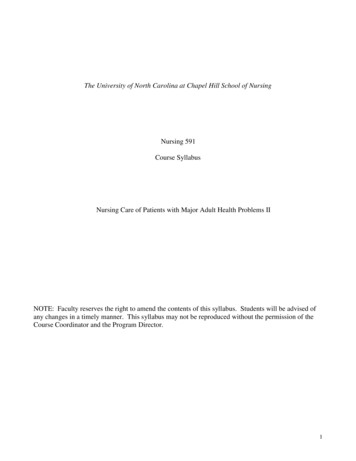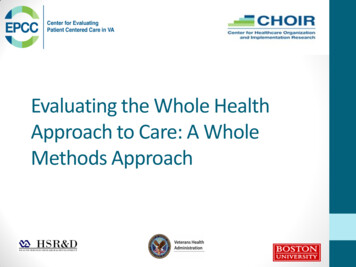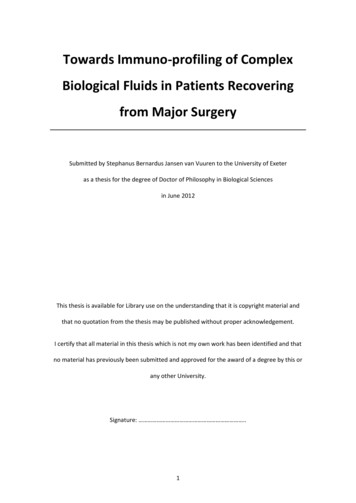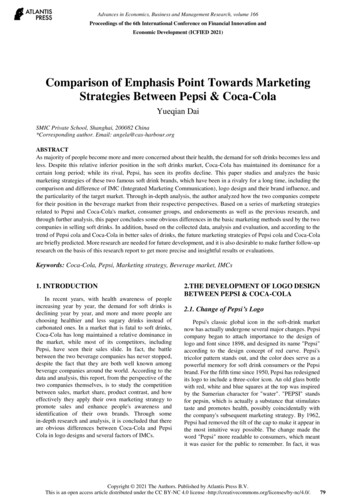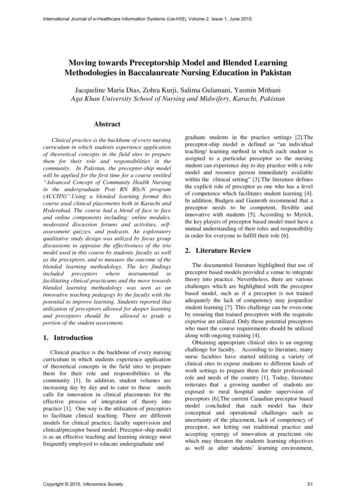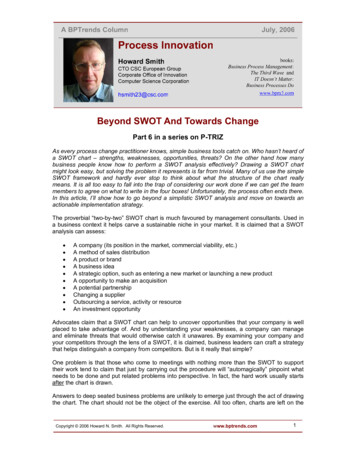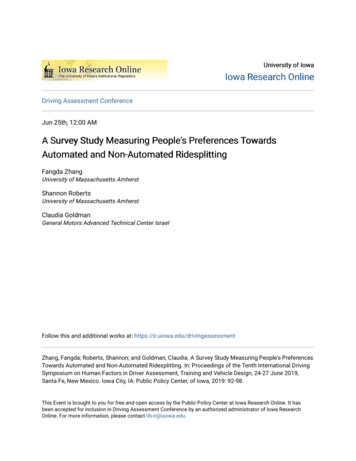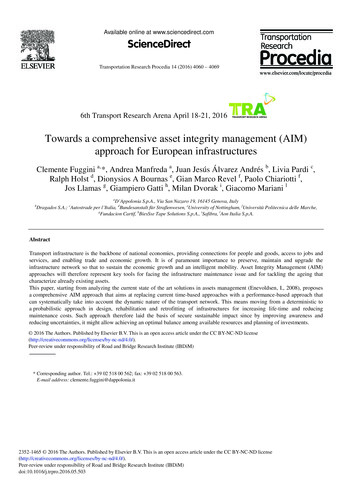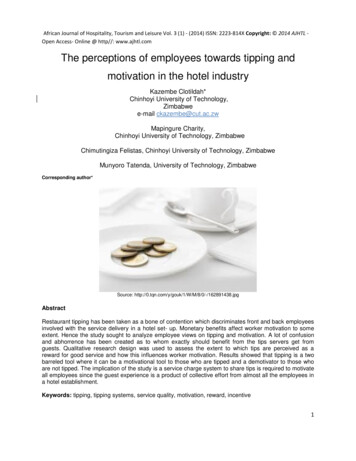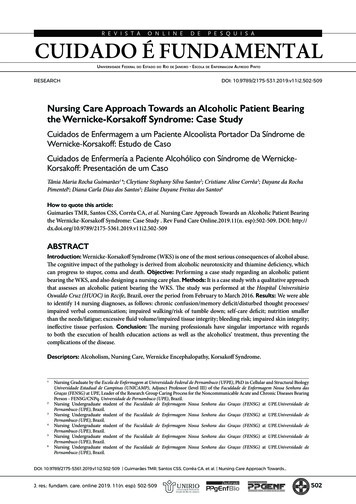
Transcription
RESEARCHDOI: 10.9789/2175-531.2019.v11i2.502-509Nursing Care Approach Towards an Alcoholic Patient Bearingthe Wernicke-Korsakoff Syndrome: Case StudyCuidados de Enfermagem a um Paciente Alcoolista Portador Da Síndrome deWernicke-Korsakoff: Estudo de CasoCuidados de Enfermería a Paciente Alcohólico con Síndrome de WernickeKorsakoff: Presentación de um CasoTânia Maria Rocha Guimarães1*; Cleytiane Stephany Silva Santos2; Cristiane Aline Corrêa3; Dayane da RochaPimentel4; Diana Carla Dias dos Santos5; Elaine Dayane Freitas dos Santos6How to quote this article:Guimarães TMR, Santos CSS, Corrêa CA, et al. Nursing Care Approach Towards an Alcoholic Patient Bearingthe Wernicke-Korsakoff Syndrome: Case Study . Rev Fund Care Online.2019.11(n. esp):502-509. DOI: -509ABSTRACTIntroduction: Wernicke-Korsakoff Syndrome (WKS) is one of the most serious consequences of alcohol abuse.The cognitive impact of the pathology is derived from alcoholic neurotoxicity and thiamine deficiency, whichcan progress to stupor, coma and death. Objective: Performing a case study regarding an alcoholic patientbearing the WKS, and also designing a nursing care plan. Methods: It is a case study with a qualitative approachthat assesses an alcoholic patient bearing the WKS. The study was performed at the Hospital UniversitárioOswaldo Cruz (HUOC) in Recife, Brazil, over the period from February to March 2016. Results: We were ableto identify 14 nursing diagnoses, as follows: chronic confusion/memory deficit/disturbed thought processes/impaired verbal communication; impaired walking/risk of tumble down; self-care deficit; nutrition smallerthan the needs/fatigue; excessive fluid volume/impaired tissue integrity; bleeding risk; impaired skin integrity;ineffective tissue perfusion. Conclusion: The nursing professionals have singular importance with regardsto both the execution of health education actions as well as the alcoholics’ treatment, thus preventing thecomplications of the disease.Descriptors: Alcoholism, Nursing Care, Wernicke Encephalopathy, Korsakoff Syndrome.123456Nursing Graduate by the Escola de Enfermagem at Universidade Federal de Pernambuco (UFPE), PhD in Cellular and Structural BiologyUniversidade Estadual de Campinas (UNICAMP), Adjunct Professor (level III) of the Faculdade de Enfermagem Nossa Senhora dasGraças (FENSG) at UPE, Leader of the Research Group Caring Process for the Noncommunicable Acute and Chronic Diseases BearingPerson - FENSG/CNPq. Universidade de Pernambuco (UPE), Brazil.Nursing Undergraduate student of the Faculdade de Enfermagem Nossa Senhora das Graças (FENSG) at UPE.Universidade dePernambuco (UPE), Brazil.Nursing Undergraduate student of the Faculdade de Enfermagem Nossa Senhora das Graças (FENSG) at UPE.Universidade dePernambuco (UPE), Brazil.Nursing Undergraduate student of the Faculdade de Enfermagem Nossa Senhora das Graças (FENSG) at UPE.Universidade dePernambuco (UPE), Brazil.Nursing Undergraduate student of the Faculdade de Enfermagem Nossa Senhora das Graças (FENSG) at UPE.Universidade dePernambuco (UPE), Brazil.Nursing Undergraduate student of the Faculdade de Enfermagem Nossa Senhora das Graças (FENSG) at UPE.Universidade dePernambuco (UPE), Brazil.DOI: 10.9789/2175-5361.2019.v11i2.502-509 Guimarães TMR, Santos CSS, Corrêa CA, et al. Nursing Care Approach Towards.J. res.: fundam. care. online 2019. 11(n. esp): 502-509502
ISSN 2175-5361.Guimarães TMR, Santos CSS, Corrêa CA, et al.RESUMOIntrodução: A síndrome de Wernicke-Korsakoff (SWK) é uma das maisgraves consequências do abuso de álcool. O impacto cognitivo da patologiaé derivado da neurotoxicidade alcóolica e deficiência de tiamina, podendoprogredir para estupor, coma e morte. Objetivo: Realizar um estudo de casode paciente alcoolista portador de SWK e construir um plano de assistênciade enfermagem. Métodos: Estudo de caso com abordagem qualitativa. Oestudo foi realizado no Hospital Universitário Oswaldo Cruz (HUOC),em Recife, Brasil, fevereiro a março de 2016. Resultados: Identificamos14 diagnósticos de enfermagem: confusão crônica/memória prejudicada/processos do pensamento perturbados/comunicação verbal prejudicada;deambulação prejudicada/risco de quedas; déficit no autocuidado; nutriçãodesequilibrada menor que as necessidades/fadiga; volume excessivo delíquido/integridade tissular prejudicada; risco de sangramento; integridadeda pele prejudicada; perfusão tissular ineficaz. Conclusão: A enfermagemtem especial importância na execução das ações de educação em saúde etratamento de alcoolistas prevenindo as complicações da doença. .Descritores: Alcoolismo, Cuidados de Enfermagem, Encefalopatia deWernicke, Síndrome de Korsakoff.RESUMENIntroducción: El síndrome de Wernicke-Korsakoff (WKS) es una de las másgraves consecuencias del abuso del alcohol. El impacto de trastorno cognitivose deriva de la neurotoxicidad alcohólica y la deficiencia de tiamina, quepuede progresar a estupor, coma y muerte. Objetivo: Realizar un estudiode caso de un paciente con SWK alcohólica y construir un plan de atenciónde enfermería. Métodos: Un estudio de caso con enfoque cualitativo. Elestudio se realizó en el Hospital Universitario Oswaldo Cruz (HUOC) enRecife, Brasil, entre febrero y marzo de 2016 Resultados: Se identificaron14 diagnósticos de enfermería: confusión crónica/deterioro de la memoria/procesos de pensamiento perturbados/alteración de la comunicación verbal;alteración de la deambulación/riesgo de caídas; déficit de autocuidado;la nutrición desequilibrada menos necesita/fatiga; volumen excesivo delíquido/ la integridad del tejido deteriorado; riesgo de sangrado; alteraciónde la integridad de la piel; la perfusión tisular ineficaz. Conclusión: Laenfermería tiene especial importancia en la implementación de las iniciativasde educación en la salud y el tratamiento de alcohólicos prevención de lascomplicaciones de la enfermedad.Descriptores: Alcoholismo, Cuidados de Enfermería, Encefalopatía deWernicke, Síndrome de Korsakoff.INTRODUCTIONThe World Health Organization (WHO) defines thealcoholic as an individual who consumes alcohol excessively, whose dependence on this substance is accompaniedby mental disorders, with changes in physical health, therelationship with the other and social and economic behavior. Since the mid-1970s, WHO has identified alcoholdependence as a recurrent chronic disease, which if leftuntreated may be fatal. Alcohol use is often associatedwith several complications that reflect both on healthand social relationships, and the prevalence of this habitdepends on individual vulnerability, the environment,and genetics.1The damage caused by excessive intake of alcoholicbeverages goes beyond the dependence developed onthe individual. Excessive alcohol intake contributes toJ. res.: fundam. care. online 2019. 11(n. esp): 502-509DOI: 10.9789/2175-5361.2019.v11i2.502-509Nursing Care Approach Towards.poor eating habits, especially among chronic alcoholics.There may also be micronutrient deficiency, regardlessof the reduction of energy intake, due to the addition ofalcohol to the daily intake. In this way, alcohol can causeboth primary malnutrition, dislocation of many nutrientsfrom the diet, and secondary malnutrition, by triggeringmalabsorption and cellular aggression due to its directcytotoxicity and impaired liver function.2Nutritional impairment represents a very explicitpublic health problem, especially in developing countries,but its significance is not restricted to these countries,since its expression in developed countries is also veryrelevant. Alcoholism and nutritional deficiency may betriggering factors for neurological disorders, includingWernicke-Korsakoff Syndrome (WKS), which results froma nutritional deficiency of vitamin B1 (thiamine) identified at the end of the last century.3At first the syndrome is characterized by a wide rangeof neuropsychiatric signs and symptoms that currentlyconsists of two distinct phases of the same pathologicalprocess: Wernicke’s encephalopathy (acute phase) characterized by mental confusion, ataxia, nystagmus andophthalmoplegia first appears. With the progression ofthe pathological process, encephalopathy can progressto a chronic state, defining Korsakoff syndrome that ismarked by the appearance of anterograde amnesia andconspiracy. If the identification and therapeutic approachof this syndrome are late, stupor, coma and, eventually,death might occur.3,4WKS is one of the most serious consequences ofalcoholism. The diagnosis of this syndrome is very difficult, since its clinical findings can be confused withthe effects of acute alcohol intoxication, justified by theproportion of cases confirmed in autopsy of Wernicke’sencephalopathy (0.8% - 2.8%) or higher to estimated inthe clinical diagnosis (0.04% - 0.13%). Nonetheless, itpresents a low mortality rate of 17%, being more prevalent in men than in women. Considering the individualswith encephalopathy who survive (estimated 80%) end updeveloping Korsakoff syndrome. This conclusion is unfortunate since the progression of the disease can be treatedearly with the administration of parenteral thiamine.5The alcohol intake during long periods causes liverdamage in such a way that it alters the functioning ofthe liver and consequently favors the malabsorption ofnutrients, which is aggravated by the little food intake,because according to the literature, severe alcoholicsreplace the meals by the consumption of more alcoholicbeverages accompanied by few nutritious snacks, aggravating their nutritional picture.6Such factors may lead to deficits in enzymatic andvitamin supplements, among which the marked deficiencyof thiamine, which is one of the essential vitamins ofthe B complex, plays a key role in the catabolism of carbohydrates and in the constitution of neurotransmitters,503
ISSN 2175-5361.Guimarães TMR, Santos CSS, Corrêa CA, et al.participating in the reactions of glycolysis and the Krebscycle to adenosine triphosphate (ATP) formation, beingpresent in practically all the cells of the human body,especially the cardiac and nervous cells.7The human body has about 30-50 mg in thiaminereserves, which is estimated to have a deficit in 2 to 3weeks. On the other hand, thiamine needs increase withalcohol abuse and increased carbohydrate intake, since theformer is catabolized in a manner similar to a glycogen.Consequently, it is understood that the combination ofan unbalanced diet, as well as a deficit of gastrointestinalabsorption, hepatic storage and cerebral utilization of thiamine compromised, as it happens in chronic alcoholism,potentiates the development of WKS.8Treatment of WKS consists of immediate intravenous or intramuscular parenteral thiamine (500 mg, 2to 3 times per day over 3 days), followed by daily oralsupplementation, which may allow a gradual reversal ofencephalopathy signs. Nevertheless, a prolonged deficiencyof thiamine causes the therapy to become ineffective. Therefore, the most important message is that one should notwait for confirmation of the diagnosis to start treatment.3Considering the alcohol addiction a recurrent chronicdisease, whose dependence is accompanied by mentaldisorders, with alterations in physical health, the relationship with the other and social and economic behavior, the present study had the goal of carrying out acase study of a WKS bearing patient, aiming to establishdiagnoses and nursing care, and also offering support forthe elaboration of interventionist actions that aim at theintegral attention and improvement of the patients’ lifequality and their relatives.METHODSIt is a descriptive case study with a qualitative approachthat was carried out at the Hospital Universitário OswaldoCruz (HUOC) in Recife, Brazil, over the period fromFebruary to March 2016. The individual was chosenaccording to criteria of interest in the clinical discussionof the case, being selected an inpatient alcoholic patientwith diagnosis of WKS who presented mental confusion,retrograde amnesia, ataxic gait, weight loss and history ofseizures after alcoholic withdrawal.Data collection was performed through anamnesis,physical examination, chart analysis and literary researchon the subject, using Horta’s nursing history as the guiding tool.9 Subsequently, the problems presented by thepatient were identified and a bibliographical research wascarried out to correlate the with available scientific output.For the selection of articles, we used the following keywords: “Alcoholism, Nursing Care, Wernicke’s Encephalopathy, Neurological Disorders, Korsakoff ’s Syndrome” inthe indexed studies databases, such as the Lilacs (LatinAmerican and Caribbean Literature in Health Science) andJ. res.: fundam. care. online 2019. 11(n. esp): 502-509DOI: 10.9789/2175-5361.2019.v11i2.502-509Nursing Care Approach Towards.the electronic journal Scielo (Scientific Electronic LibraryOnline). After the analysis and interpretation of the data,the diagnoses were formulated according to the NorthAmerican Nursing Diagnosis Association (NANDA),10 theinterventions proposed according to the Nursing Interventions Classification (NIC)11 and the expected resultsfor the patient.The study was conducted according to the ResolutionNo. 466/2012 of the National Health Council from theHealth Ministry, and approved by the Research EthicsCommittee from the HUOC, Legal Opinion No. 1.378.156,under the Certificado de Apresentação para Apreciação Ética(CAAE) [Certificate of Presentation for Ethical Appraisal]No. 50764815.8.0000.5192. The person in charge of thepatient was guided by the research objective, consentedto the study and signed the Free and Informed ConsentTerm. The study presented minimal risk of patient embarrassment during the interview and physical examinationbeing guaranteed the privacy of the same. The identity ofthe patient was kept confidential, and the anonymity ofthe information was guaranteed through the signature bythe researchers of the ter
impaired verbal communication; impaired walking/risk of tumble down; self-care deficit; nutrition smaller than the needs/fatigue; excessive fluid volume/impaired tissue integrity; bleeding risk; impaired skin integrity; ineffective tissue perfusion. Conclusion: The nursing professionals have singular importance with regards
